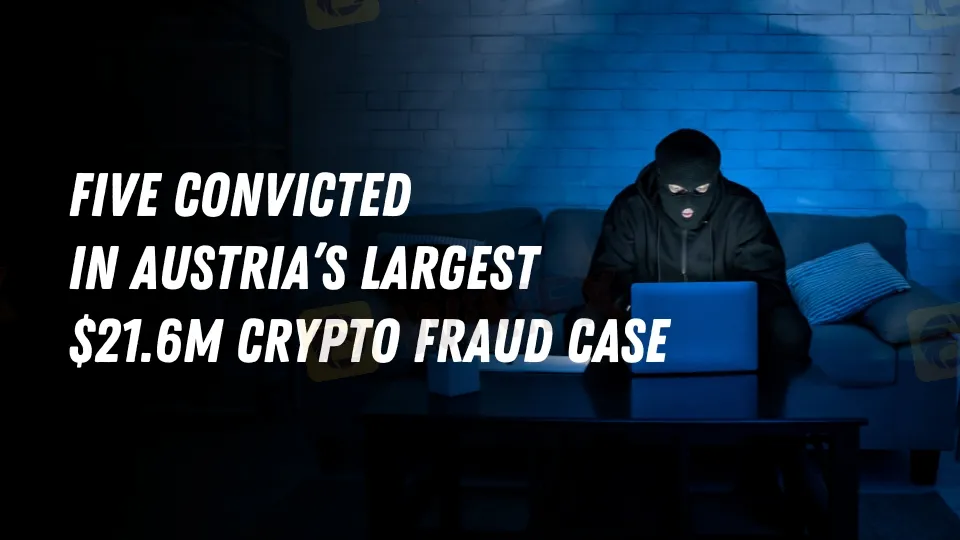简体中文
繁體中文
English
Pусский
日本語
ภาษาไทย
Tiếng Việt
Bahasa Indonesia
Español
हिन्दी
Filippiiniläinen
Français
Deutsch
Português
Türkçe
한국어
العربية
Five Convicted in Austria’s Largest $21.6M Crypto Fraud Case
Abstract:Five individuals have been sentenced for their involvement in Austria’s largest cryptocurrency fraud, scamming $21.6 million from investors. The lavish lifestyle they funded has shocked many.

Cryptocurrency frauds continue to make headlines, with one of the most serious instances being resolved in Austria. Five people were jailed for scamming 40,000 investors in a $21.6 million Bitcoin scheme. The operation, which revolved around the EXW Wallet and the EXW cryptocurrency token, has been dubbed the greatest fraud case in Austrian history.
The Lavish Lifestyle of Crypto-Fraudsters
One of the most notable features of this case was the fraudsters' lavish lifestyle. They used stolen money to buy luxury things and activities such as a shark tank, private plane flights, and even more than $100,000 for sex workers. The fraudsters partied in some of Dubai's most prestigious clubs and flew on private aircraft, flaunting their illicit fortune.
The stolen money was not only spent in Dubai but also returned to Austria in plastic bags. The operation was worldwide, but the absence of an extradition agreement between Austria and the United Arab Emirates posed legal challenges to the inquiry.

Fraudulent Schemes Behind the EXW Wallet
Launched in 2019, the EXW Wallet guaranteed daily earnings of 0.1% to 0.32%, attracting hundreds of investors with excessive hopes. The scammers also offered real estate investments, and they are now being investigated for another scheme involving a cannabis-related investment that reportedly scammed 17,000 victims of $17.2 million. Despite its grandiose claims, the EXW plan failed in 2020, leaving investors empty-handed.
The legal processes resulted in the sentencing of five people, two of them were sentenced to five years in jail, two others to 30 months, and one to 18 months. In addition to these punishments, five other offenders were acquitted, while others are still on the run.
Final Thoughts
This crypto fraud case serves as a sharp warning of the hazards connected with cryptocurrency investments, particularly when high-yield promises seem too good to be true. The scammers' opulent lifestyle serves as a warning story for investors and authorities. As the cryptocurrency world advances, so must the vigilance of individuals seeking to safeguard their money from such scams. With appeals pending, this issue may not be entirely settled, but it has already made an indelible impression on Austria's legal and financial history.

Disclaimer:
The views in this article only represent the author's personal views, and do not constitute investment advice on this platform. This platform does not guarantee the accuracy, completeness and timeliness of the information in the article, and will not be liable for any loss caused by the use of or reliance on the information in the article.
Read more

UK Authorities Freeze Nearly $7.7 Million in Illicit Crypto Assets Within a Year
Crypto wallets tied to fraud and tax evasion were frozen under new enforcement powers granted in 2024.

Australian Regulator Warns of Money Laundering and Fraud Risks in Crypto ATMs
Australia’s financial regulator has expressed concern about how cryptocurrency ATMs are being used across the country, particularly in relation to illicit financial activity. Authorities are now increasing pressure on ATM operators to improve monitoring standards and ensure compliance with national regulations.

Webull Launches SMSF Investment Platform with Zero Fees
Webull introduces commission-free SMSF trading, offering over 3,500 US and Australian ETFs, with no brokerage fees and enhanced portfolio tools.

April Fool's Day Scam Prevention Experience Collection
Share your “Forex Fraud Prevention Experience”, win WikiFX points and gold rewards!
WikiFX Broker
Latest News
How Crypto Trading Transforms FX and CFD Brokerage Industry
FCA Warns Against 10 Unlicensed or Clone Firms
CySEC Warns Against 14 Unlicensed Investment Websites
Top Currency Pairs to Watch for Profit This Week - March 31, 2025
Will natural disasters have an impact on the forex market?
Philippines Deports 29 Indonesians Linked to Online Scam Syndicate in Manila
Exposing the Top 5 Scam Brokers of March 2025: A Closer Look by WikiFX
Gold Prices Climb Again – Have Investors Seized the Opportunity?
Webull Launches SMSF Investment Platform with Zero Fees
Australian Regulator Warns of Money Laundering and Fraud Risks in Crypto ATMs
Currency Calculator







